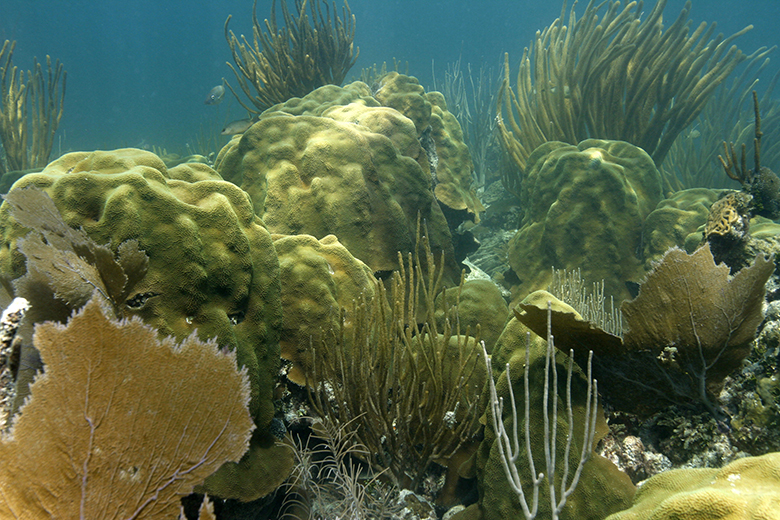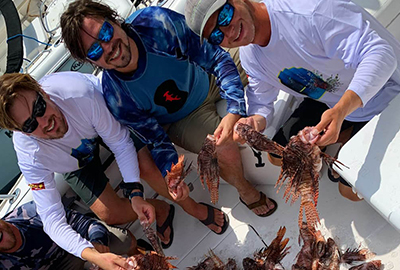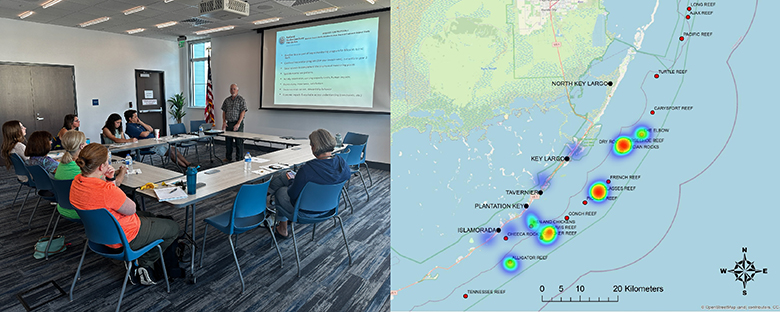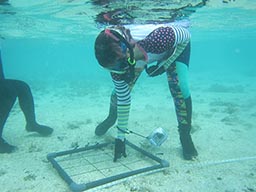- ABOUT US
- PROGRAM AREAS
- CONSERVATION APPROACH
- EDUCATION
- MULTIMEDIA
- the status and trends of human use and access to restored and unrestored coral reef sites,
- perceptions of visitors to the sites and the restoration efforts,
- stewardship behaviors, and,
- the economic benefits of restoration.
Socioeconomic Monitoring for Mission: Iconic Reefs
By: Mary Allen, NOAA Coral Reef Conservation Program, Danielle Schwarzmann, NOAA Office of National Marine Sanctuaries and Robert Burns, Ross Andrew, and Chris Schwinghammer, West Virginia University
Takeaway: A new socioeconomic monitoring program will assess the effects of coral restoration on reef users, human communities, and ecosystem services.
In the Florida Keys, the reef forms the foundation of the region's identity, providing habitat for ecologically and economically important species and drawing visitors seeking to dive, snorkel, and fish. All of these benefits rely on healthy coral reef ecosystems, but this reef, along with many of our reefs, is threatened by pollution, climate change, coral disease, and more. In response, Mission: Iconic Reefs is underway to change the trajectory of the health of seven iconic coral reefs in Florida.

Mission: Iconic Reefs (M:IR) is a multi-decade initiative to restore seven iconic reefs in Florida Keys National Marine Sanctuary (FKNMS). In addition to M:IR Field Team monitoring that tracks restoration progress & effectiveness, monitoring that assesses the human dimension is also crucial to demonstrate how restoration can support ecosystem services and coastal communities.
The main goals for socioeconomic monitoring are to understand:
Socioeconomic monitoring complements M:IR biophysical monitoring for a holistic understanding of restoration and its impacts to society. Robust socioeconomic analyses contribute to a variety of societal goals and values, such as a healthy economy and sustainable communities.

Developing a M:IR Socioeconomic Monitoring Program
NOAA's Coral Reef Conservation Program and Office of National Marine Sanctuaries are working with M:IR partners to develop a socioeconomic monitoring program. West Virginia University, with support provided by NOAA's Office of Habitat Conservation through the National Marine Sanctuary Foundation, is assisting in the development of the program over the next three years. This program includes collection of human use and perception data using multiple methods to quantify resource use throughout Florida Keys National Marine Sanctuary. Collected data will address perceptions, knowledge, stewardship sentiments, and educational factors related to coral reef resources and restoration. Traditional on-the-ground surveying of recreators in the Sanctuary will be coupled with innovative methods using remotely-sensed data to create a comprehensive picture of human-use patterns. By using these techniques, a representative sample of coral reef users will be obtained to evaluate the socioeconomic dynamics of the coral reef restoration being performed by M:IR.
Ultimately, the goal of this sampling framework is to set up a monitoring protocol that is sustainable in the long-term for collecting recreation data in the FKNMS.
Stakeholder engagement and workshops
Between February and April 2023, four stakeholder workshops were conducted by M:IR socioeconomic monitoring team members. The goals of the workshops were to inform sampling plan development and potential survey questions from local recreation experts. Stakeholders such as charter operators, marina owners, outdoor camp directors, local citizens, and others with knowledge of marine recreation resources were invited to participate and provide insight into coral reef use and restoration. Workshops included a guided survey and discussion. Over 20 stakeholders attended and shared their perspectives on use patterns (where and when people recreate), iconic reef knowledge and support, substitution behavior (alternative sites they visit or activities they do), and benefits and burdens of coral reef conservation.

Key takeaways from the workshops included that a majority (95%) of respondents support coral reef restoration while only a little over half (57%) believe that it will be successful in the long-term (10+ years). Over half (57%) had stopped visiting a reef site because its quality had degraded. Communication efforts of Mission: Iconic Reefs appear successful, with 76% of respondents having heard of M:IR prior to attending the workshop. Additional input in workshops provided qualitative data with important themes surrounding sustainability, regulation, management, benefit trade-offs, healthy ecosystem definitions, and livelihood dependency related to coral reef ecosystems.

Next Steps
The monitoring program is taking a phased approach with long-term investments in mind. The stakeholder workshops were part of Phase 1. Phases 2-4 will involve the development of the sampling methodology, including on-the-ground surveys and data analyses, and communication and outreach about the results.
This program represents a strong investment into the socioeconomic science that is so critical in defining human connections and long-term sustainability of protected area resources management. The Mission: Iconic Reef team is robust and is forging an interdisciplinary monitoring and management future for the Florida Keys and many other marine protected areas.
About Us

The NOAA Coral Reef Conservation Program was established in 2000 by the Coral Reef Conservation Act. Headquartered in Silver Spring, Maryland, the program is part of NOAA's Office for Coastal Management.

The Coral Reef Information System (CoRIS) is the program's information portal that provides access to NOAA coral reef data and products.
Work With US
U.S. Coral Reef Task Force
Funding Opportunities
Employment
Fellowship Program
Contracting Assistance
Graphic Identifier
Featured Stories Archive

Access the archive of featured stories here...
Feedback
Thank you for visiting NOAA’s Coral Reef Conservation Program online. Please take our website satisfaction survey. We welcome your ideas, comments, and feedback. Questions? Email coralreef@noaa.gov.
Stay Connected
Contact Us
NOAA’s Coral Reef Conservation Program
SSMC4, 10th Floor
1305 East West Highway
Silver Spring, MD 20910
coralreef@noaa.gov
